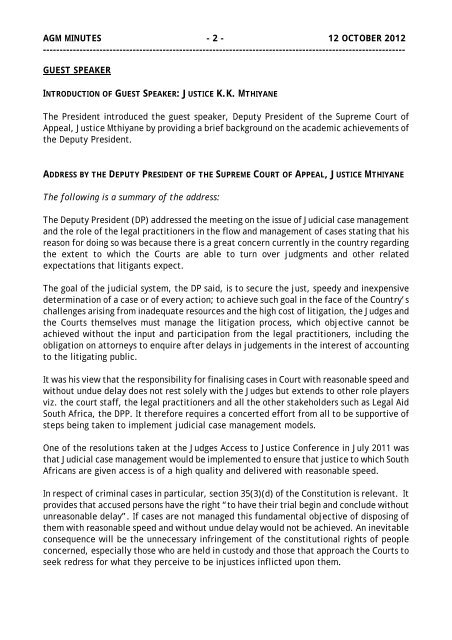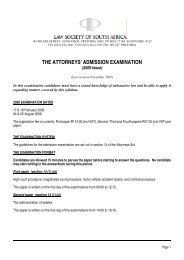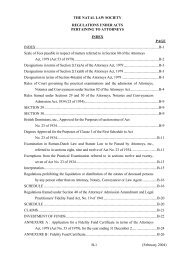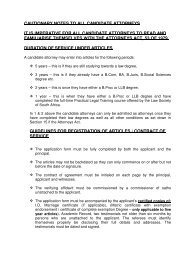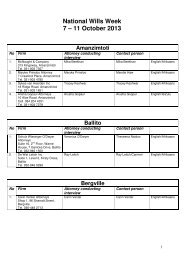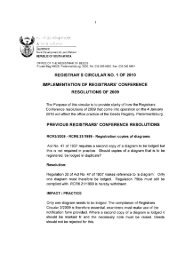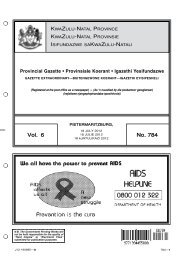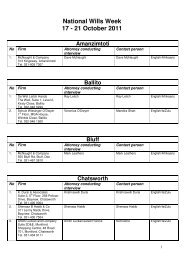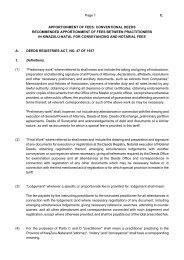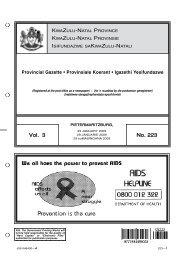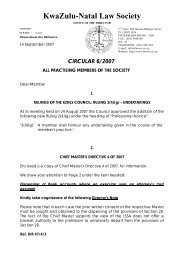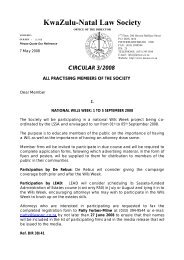a.1 - Natal Law Society
a.1 - Natal Law Society
a.1 - Natal Law Society
Create successful ePaper yourself
Turn your PDF publications into a flip-book with our unique Google optimized e-Paper software.
AGM MINUTES - 2 - 12 OCTOBER 2012<br />
-------------------------------------------------------------------------------------------------------------<br />
GUEST SPEAKER<br />
INTRODUCTION OF GUEST SPEAKER: JUSTICE K.K. MTHIYANE<br />
The President introduced the guest speaker, Deputy President of the Supreme Court of<br />
Appeal, Justice Mthiyane by providing a brief background on the academic achievements of<br />
the Deputy President.<br />
ADDRESS BY THE DEPUTY PRESIDENT OF THE SUPREME COURT OF APPEAL, JUSTICE MTHIYANE<br />
The following is a summary of the address:<br />
The Deputy President (DP) addressed the meeting on the issue of Judicial case management<br />
and the role of the legal practitioners in the flow and management of cases stating that his<br />
reason for doing so was because there is a great concern currently in the country regarding<br />
the extent to which the Courts are able to turn over judgments and other related<br />
expectations that litigants expect.<br />
The goal of the judicial system, the DP said, is to secure the just, speedy and inexpensive<br />
determination of a case or of every action; to achieve such goal in the face of the Country’s<br />
challenges arising from inadequate resources and the high cost of litigation, the Judges and<br />
the Courts themselves must manage the litigation process, which objective cannot be<br />
achieved without the input and participation from the legal practitioners, including the<br />
obligation on attorneys to enquire after delays in judgements in the interest of accounting<br />
to the litigating public.<br />
It was his view that the responsibility for finalising cases in Court with reasonable speed and<br />
without undue delay does not rest solely with the Judges but extends to other role players<br />
viz. the court staff, the legal practitioners and all the other stakeholders such as Legal Aid<br />
South Africa, the DPP. It therefore requires a concerted effort from all to be supportive of<br />
steps being taken to implement judicial case management models.<br />
One of the resolutions taken at the Judges Access to Justice Conference in July 2011 was<br />
that Judicial case management would be implemented to ensure that justice to which South<br />
Africans are given access is of a high quality and delivered with reasonable speed.<br />
In respect of criminal cases in particular, section 35(3)(d) of the Constitution is relevant. It<br />
provides that accused persons have the right “to have their trial begin and conclude without<br />
unreasonable delay”. If cases are not managed this fundamental objective of disposing of<br />
them with reasonable speed and without undue delay would not be achieved. An inevitable<br />
consequence will be the unnecessary infringement of the constitutional rights of people<br />
concerned, especially those who are held in custody and those that approach the Courts to<br />
seek redress for what they perceive to be injustices inflicted upon them.


